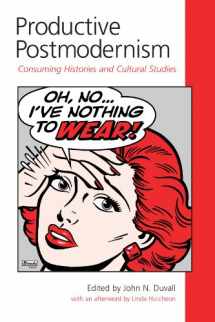
Productive Postmodernism: Consuming Histories and Cultural Studies (Suny Series in Postmodern Culture)
ISBN-13:
9780791451946
ISBN-10:
0791451941
Edition:
Illustrated
Author:
John N. Duvall
Publication date:
2001
Publisher:
State University of New York Press
Format:
Paperback
238 pages
Category:
Criticism
,
Arts History & Criticism
,
Aesthetics
,
Philosophy
,
Popular Culture
,
Social Sciences
FREE US shipping
Book details
ISBN-13:
9780791451946
ISBN-10:
0791451941
Edition:
Illustrated
Author:
John N. Duvall
Publication date:
2001
Publisher:
State University of New York Press
Format:
Paperback
238 pages
Category:
Criticism
,
Arts History & Criticism
,
Aesthetics
,
Philosophy
,
Popular Culture
,
Social Sciences
Summary
Productive Postmodernism: Consuming Histories and Cultural Studies (Suny Series in Postmodern Culture) (ISBN-13: 9780791451946 and ISBN-10: 0791451941), written by authors
John N. Duvall, was published by State University of New York Press in 2001.
With an overall rating of 3.6 stars, it's a notable title among other
Criticism
(Arts History & Criticism, Aesthetics, Philosophy, Popular Culture, Social Sciences) books. You can easily purchase or rent Productive Postmodernism: Consuming Histories and Cultural Studies (Suny Series in Postmodern Culture) (Paperback) from BooksRun,
along with many other new and used
Criticism
books
and textbooks.
And, if you're looking to sell your copy, our current buyback offer is $0.56.
Description
Investigates a broad range of contemporary fiction, film, and architecture to address the role of history in postmodern cultural productions.
Productive Postmodernism addresses the differing accounts of postmodernism found in the work of Fredric Jameson and Linda Hutcheon, a debate that centers around the two theorists’ senses of pastiche and parody. For Jameson, postmodern texts are ahistorical, playing with pastiched images and aesthetic forms, and are therefore unable to provide a critical purchase on culture and capital. For Hutcheon, postmodern fiction and architecture remain political, opening spaces for social critique through a parody that deconstructs official history. Thinking in the space between these two sharply different positions, the essays in this collection investigate a broad range of contemporary fiction, film, and architecture―from such narratives as Don DeLillo’s Libra, Toni Morrison’s Beloved, and Ridley Scott’s Blade Runner, to the vastly different spaces of Las Vegas casinos and the United States Holocaust Memorial Museum―in order to ask what the cultural work of a postmodern aesthetic might be.
Productive Postmodernism addresses the differing accounts of postmodernism found in the work of Fredric Jameson and Linda Hutcheon, a debate that centers around the two theorists’ senses of pastiche and parody. For Jameson, postmodern texts are ahistorical, playing with pastiched images and aesthetic forms, and are therefore unable to provide a critical purchase on culture and capital. For Hutcheon, postmodern fiction and architecture remain political, opening spaces for social critique through a parody that deconstructs official history. Thinking in the space between these two sharply different positions, the essays in this collection investigate a broad range of contemporary fiction, film, and architecture―from such narratives as Don DeLillo’s Libra, Toni Morrison’s Beloved, and Ridley Scott’s Blade Runner, to the vastly different spaces of Las Vegas casinos and the United States Holocaust Memorial Museum―in order to ask what the cultural work of a postmodern aesthetic might be.


We would LOVE it if you could help us and other readers by reviewing the book
Book review

Congratulations! We have received your book review.
{user}
{createdAt}
by {truncated_author}


